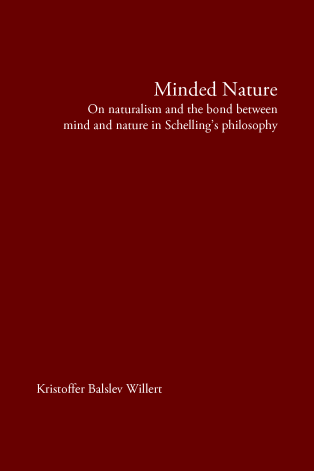Minded Nature: On naturalism and the bond between mind and nature in Schelling’s philosophy
Nøgleord:
Schelling, Naturalism, Philosophy, Metaphysics, NatureSynopsis
This thesis develops a metaphysical framework for understanding the bond between “nature” and “mind”. The framework is modelled on F. W. J. Schelling’s philosophy as he presents it between 1795 and 1809. Dissatisfied, both from a metaphysical (theoretical) and existential (practical) point of view, with the common ways of answering the question about how nature and mind hang together – e.g., Cartesian dualism, reductive materialism, Kantian standpoint-dualism, and Fichtean constructivism – Schelling proposed a framework with historical and contemporary relevance. From a set of simple explanatory principles – e.g., minds exist, there is only one world, nothing comes out of nothing – he argued that we can only make sense of the existence of human mindedness if we recalibrate some of our basic understandings of the natural order. Such a recalibration strives to deflate certain “crude” conceptions of what it means for something to be physical or natural that are still caught up in a set of mechanistic assumptions inherited from the 17th and 18th century. To think less crudely about the physical entails that “mindedness” – and its related features such as autonomous agency – is not a human privilege. For example, other organic beings act and think too. In that sense, Schelling’s view has a range of echoes within contemporary theory (e.g., new materialisms) that defies human exceptionalism. That does not entail, as I argue in the thesis, that humans are not distinct from the rest of nature. But it does mean that this distinctness occupies a point, a very indefinite and potentially dangerous one, on a continuum alongside everything else.
The radicality of Schelling’s account, which I reconstruct as a Spinoza-influenced version of what contemporaries call neutral monism, is that not only do non-human organisms have degrees of autonomy, conceptuality, and sentience (which should not be controversial); we must also understand the inorganic world (“matter”) as being structurally isomorphic to the organic world in terms of being self-organizing and active as fundamentally relational. This is the central aim of Schelling’s so-called Naturphilosophie. We could also call Schelling’s monism a form of naturalism, but an expanded or open-minded kind. Everything in nature – from chemical substances and blades of grass to human moral agency – (also) contains, to a certain degree, what he calls “ideal” aspects.
I will argue that Schelling’s metaphysical model exhibits a radically new world-picture that is designed to challenge and replace other world-pictures that, at least since “modernity”, have been governing how we think about our place in nature. Such a strategy is more imperative today than ever. As I will argue towards the end of the thesis, Schelling’s anti-mechanism and his broadening of the concept of mind in the natural world can have direct influence how to understand and engage today’s environmental catastrophes that result from what Schelling calls the “economic” and “exploitative” view on nature that he associates with Fichte’s idealism and modern philosophy as such. Whereas other world-pictures entail an “annihilation” of nature by reducing its myriads of life to machine-like things that have nothing but instrumental value, what Schelling seeks is a basis for humans to develop “sympathetic” relations to the natural world.
Chapter 1 and 2 present contemporary and historical attempts to answer how mind and nature hang together, namely reductive materialism, liberal naturalism, and Kantian standpoint-dualism. The rest of the thesis is staged around Schelling’s dissatisfaction with all these answers. In Chapter 3, I present Schelling’s systematic methodology and how we see an attempt to overcome Kantian dualism in some of Schelling’s earliest texts. Chapter 4 is about Schelling’s Naturphilosophie. Chapter 5 is about what I call Schelling’s philosophical anthropology, which is supposed to supplement the Naturphilosophie. In Chapter 6, I present Schelling’s neutral monism as a result of the conclusions in the previous chapters. In the Conclusion, I point towards the ecological aspects of Schelling’s thinking that can be relevant for contemporary perspectives.

